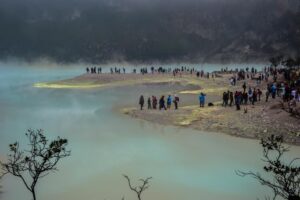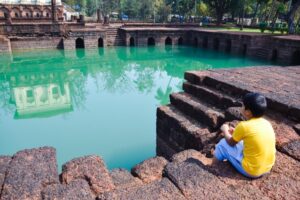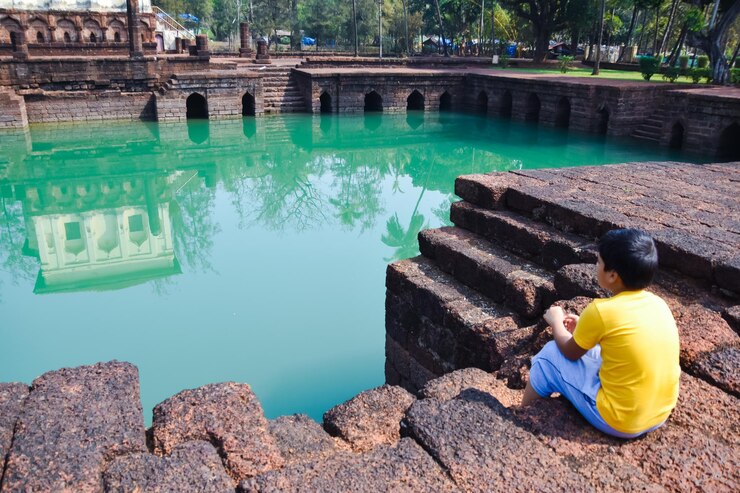Nestled along the banks of the Bhagirathi River in Murshidabad district, West Bengal, Jangipur is a town that seamlessly blends historical significance with contemporary vibrancy. Often overshadowed by its more prominent neighbors, Jangipur offers a unique tapestry of culture, industry, and scenic beauty that beckons travelers and history enthusiasts alike.

A Glimpse into Jangipur’s Rich History
Jangipur’s origins trace back to the Mughal era when it was known as Jahangirpur, named after Emperor Jahangir. During this period, it served as a strategic military camp. Under British colonial rule, the town, then referred to as Jungypore, emerged as a significant hub for silk and indigo trade, housing East India Company residencies. The renowned ‘Jungypore silk’ was a coveted commodity in European markets. However, over time, the town faced challenges, including river erosion, which led to the relocation of administrative offices to Raghunathganj, situated across the river.

Geography and Strategic Importance
Situated in the Rarh region, Jangipur boasts gently undulating terrain slightly elevated above the surrounding plains. Its proximity to the Ganges and its distributaries has historically made it a vital location for trade and agriculture. The town’s strategic position is further underscored by its closeness to the Farakka Barrage, one of India’s most significant infrastructural projects.

Economic Landscape: A Blend of Tradition and Modernity
Jangipur’s economy is a harmonious blend of traditional industries and modern enterprises.
Beedi Industry: The town is renowned for its beedi (traditional hand-rolled cigarette) industry, employing approximately one million workers in the subdivision. Notably, 90% of these workers operate from home, with women constituting 70% of this workforce. citeturn0search12
Handloom and Handicrafts: Jangipur’s handloom sector produces exquisite silk sarees, cotton fabrics, and traditional Bengali garments. Additionally, artisans craft terracotta pottery and intricate wood carvings, reflecting the town’s rich cultural heritage. citeturn0search1
Agriculture and Manufacturing: The surrounding region is predominantly agricultural, focusing on rice cultivation, jute, wheat, and various pulses. The town also hosts small-scale manufacturing units producing plastic goods, metal utensils, leather products, and processed foods. citeturn0search1
Educational and Healthcare Infrastructure
Jangipur places a strong emphasis on education and healthcare.
Education: Established in 1950, Jangipur College, affiliated with the University of Kalyani, offers a range of undergraduate and postgraduate courses across arts, science, and commerce streams. The Management Development Institute of Murshidabad, inaugurated in 2014, stands as a premier institution for management studies in the region. citeturn0search0
Healthcare: The town is served by the Jangipur Subdivisional Hospital, equipped with 250 beds, and the Jangipur Superspeciality Hospital, catering to advanced medical needs of the populace. citeturn0search0
Connectivity and Transportation
Jangipur boasts robust connectivity, facilitating seamless travel and trade.
Roadways: The town is well-connected to Kolkata and the district headquarters, Baharampur, via National Highway 34, ensuring smooth vehicular movement.
Railways: The Jangipur Road railway station, located in Raghunathganj, lies on the Azimganj-Farakka line, with numerous express and passenger trains halting here, linking the town to various parts of the country. citeturn0search0
Cultural Tapestry and Tourist Attractions
Jangipur is a melting pot of cultures, traditions, and architectural marvels.

Historical Sites: Visitors can explore remnants of the town’s colonial past, including old trade centers and administrative buildings. The nearby Adina Mosque, though not within Jangipur, is a significant historical site that adds to the region’s allure. citeturn0search2
Natural Beauty: The serene banks of the Bhagirathi River offer picturesque spots for relaxation and boat rides. The surrounding countryside, with its lush greenery and gentle hills, provides a tranquil retreat for nature enthusiasts.
Local Markets: The bustling bazaars of Jangipur are a shopper’s delight, offering a plethora of traditional handicrafts, textiles, and local delicacies, encapsulating the essence of Bengali culture. citeturn0search2
Administrative Evolution and Governance
In a significant administrative development, the Jangipur Police District was established on January 1, 2020, following the bifurcation of the erstwhile Murshidabad District. The district encompasses seven police stations, including specialized units for women and cybercrime, underscoring the region’s commitment to comprehensive law enforcement. The district headquarters is situated in Jangipur town. citeturn0search3
Conclusion: Embracing Jangipur’s Unique Identity
Jangipur stands as a testament to the harmonious coexistence of history and modernity. Its rich tapestry of cultural heritage, economic vitality, and scenic beauty positions it as a noteworthy destination in West Bengal. Whether you’re a history buff, a cultural enthusiast, or a traveler seeking off-the-beaten-path experiences, Jangipur promises a journey filled with discovery and charm.



